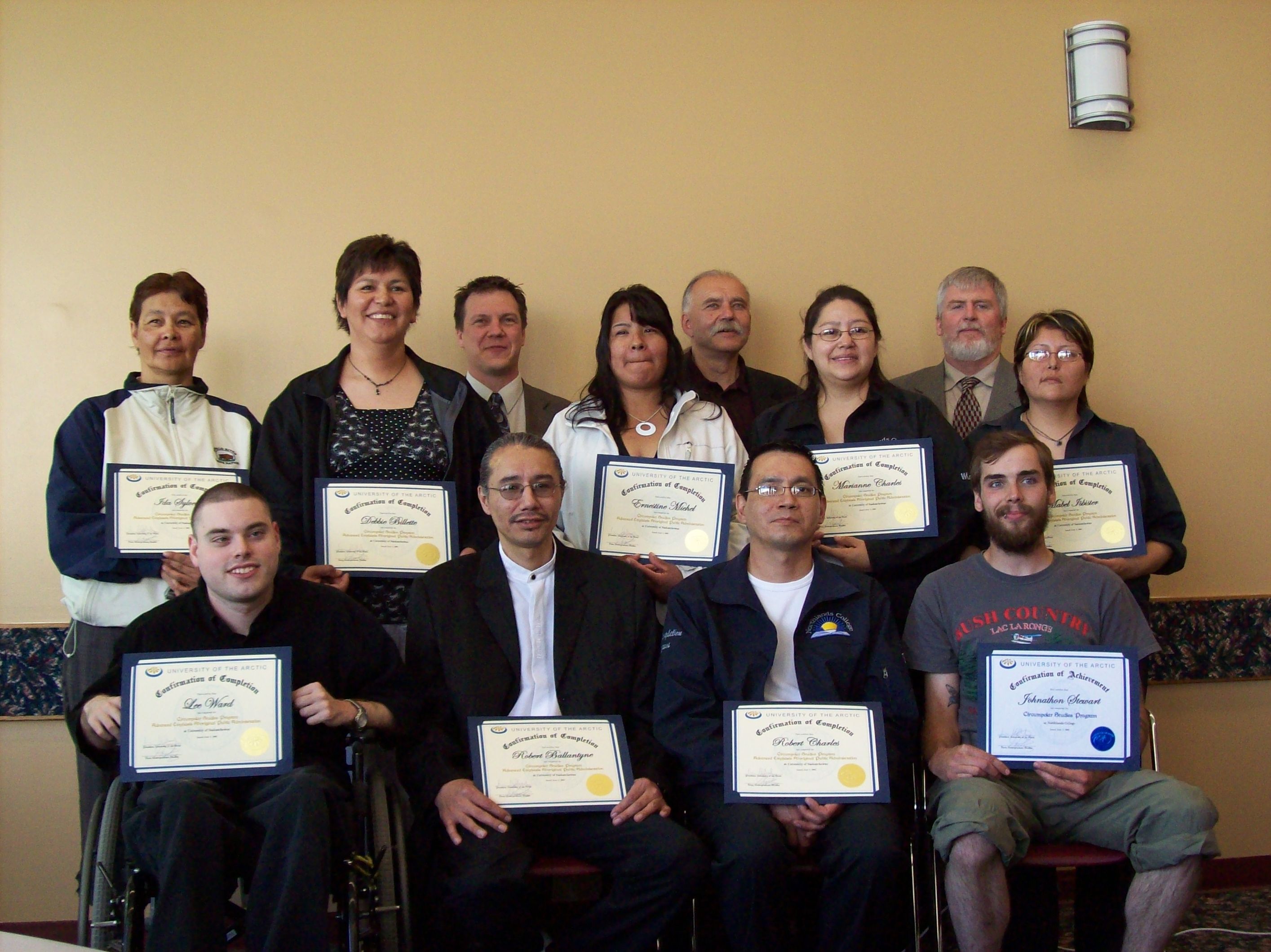UArctic Students Make History
Fri, Oct 24, 2008
 In June, these students will become the first North American graduates of the University of the Arctic.
In June, these students will become the first North American graduates of the University of the Arctic.Front Row: Lee Ward, Robert Ballantyne, Bobby Charles, John Stewart
Middle Row: Ida Sylvestre, Debbie Billette, Ernestine Michel, Marianne Charles, Mabel Isbister
Back Row: Greg Poelzer, Dean of Undergraduate Studies, University of the Arctic
Bill McLaughlin, CEO, Northlands College
Alec Aitken, Chair, Northern Studies, University of Saskatchewan
Two years ago Mabel Isbister knew she wanted to continue her post-secondary education. The La Ronge-area single mother had been able to complete a Business Administration Certificate in the community; but when she looked for ways to continue studying in that field, she came up against a barrier: every option would involve relocation south at some point. “I have five children,” Isbister says. “I just couldn't move down south.” Then she heard about a joint University of Saskatchewan/Northlands College/University of the Arctic degree program with an emphasis on Aboriginal Public Administration - available entirely by distance education. Isbister knew it was for her.
She was not alone. According to Glenys Plunz, University Coordinator for Northlands College, there are a large number of people in northern Saskatchewan who have university credits, but who have not completed a degree because Saskatchewan university programs typically require a significant portion of on-campus study. “I’m always looking for more Distance Education options for our students,” says Plunz. “Saskatchewan’s universities have offered Distance Delivered courses for some time, and Northlands College has built a strong ‘supportive program approach’ for Distance Ed. over the years. When I learned that UArctic had developed a core of courses focused on northern issues, I knew the potential was there for a degree-completion program for our students.” University of the Arctic partnership with the University of Saskatchewan and Northlands College enabled the creation of a B.A. in Northern Studies. The first group of students entered the Degree Completion Program two years ago. “Students need to have completed at least 30 university credits to enter the program; two years in this program then gives them either a 3-yr. or a 4-yr. BA, depending on how many credits they had when they entered,” explained Plunz.
And so in June, Mabel Isbister, along with six other students from northern Saskatchewan, and one from northern B.C., will make history: they will be the first North American graduates of the University of the Arctic. Previous UArctic grads have come from Norway and Russia.
The seven Saskatchewan students will convocate at the U of S October 25th, 2008 receiving a Bachelor of Arts in Northern Studies with an Advanced Emphasis in Aboriginal Public Administration.
Students in La Ronge were not the only northerners able to take advantage of the program. Teleconferencing connected students in Creighton and Buffalo Narrows as well. Lee Ward, who uses a wheelchair, wanted to stay in his home community of Creighton after highschool. “For me, finding housing in Saskatoon would be very hard. Until I entered this program, I had taken only a series of disjointed courses. Now I’ll have a degree.” Ernestine Michel from Pelican Narrows moved to Creighton with her children to take the program. “I still had to move, but it was closer than Saskatoon, and my kids adjusted better because Creighton is still a small town.”
On the West Side, Debbie Billette, from Dillon, stated: “I tried on-campus in Saskatoon and it was overwhelming for me at the time. I’ve been more successful here.”
Small class size, tutor support and encouragement from on-site staff characterize Northlands College’s approach to Distance Education. Bobby Charles, a La Ronge student, attributes much of his success to those factors: “I tried studying in Saskatoon, but there definitely was a ‘culture shock’.” He also cites the flexibility of on-line courses as a positive:
